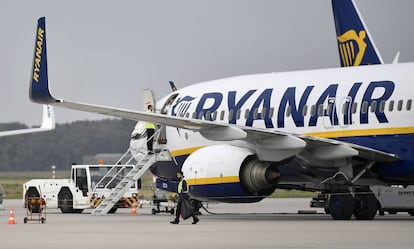Ryanair makes second change in a year to hand-baggage rules
From today, customers of the Irish airline will have to pay between €6 and €25 for certain sizes of case, and even then not all travelers will be able to take them onto the aircraft

Passengers flying with Ryanair will have to dig a little deeper into their pockets from today if they want to take a suitcase with them. The Irish airline has just brought in a new baggage policy that obliges all passengers to pay for cases, even if they are the reduced 55cm x 40cm x 20cm hand-luggage items that at one point were allowed on for free.
The charges will of course mean a new source of income for the low-cost carrier
The company says that the new rules are aimed at speeding up the embarkation and disembarkation process, but the charges will of course mean a new source of income for the low-cost carrier. Passengers who buy Priority Boarding with their tickets, at a cost of €6, will be able to take a 55cm x 40cm x 20cm item onto the plane along with a small item of baggage measuring 40cm x 25cm x 20cm. Those who don’t will have to pay €8 per larger item, and drop it off at the Ryanair check-in desks before going through security. The item will be stored in the hold and will have to be collected from the baggage carousels on arrival at the destination airport.
Until now, passengers without Priority Boarding had to leave their suitcase at the gate, where it was taken down into the hold for free, and also had to be collected from the baggage belts on arrival. After this change, these passengers will have to pay and check in their cases.
This payment will have to be done during the online booking process. But if a passenger opts to add a case later on – this is permitted up to 40 minutes before the flight time – the cost will go up to €10. If you arrive at the gate with a case and have not checked it previously, and you don’t have Priority Boarding, you will have to pay €25 and your case will be taken down to the hold.
Ryanair is also very strict about the size of the small items that all passengers can take on board, such as handbags. These items can be no bigger than the aforementioned 40cm x 20cm x 25cm size, and have to be placed under the seat in front of the passenger.
Ryanair is also very strict about the size of the small items that all passengers can take on board, such as handbags
The paradox of this new policy is that Priority Boarding passengers will pay €2 less than the rest of passengers, and they also have the advantage of taking their case and small item on board the plane. The rest of the passengers will have to pay €8 and will have to collect their luggage from the carousel. The trick is that there will only be 95 Priority Boarding passengers on each flight. That means that half of the passengers will not be able to buy these tickets and will have to pay a minimum €8 instead of €6.
Ryanair’s main justification for the change is not to boost income, but to “reduce delays to flights and bring down the cost of checked luggage,” because until now, as many as 120 cases had to be tagged at the plane, meaning the boarding process was regularly exceeding the allotted 25 minutes.
But this claim is in contrast to the company’s financial data. When Ryanair last changed its policy, in January – only been allowing passengers with Priority Boarding to take cases on the plane, at a cost of €6 per flight – its complementary revenue (onboard sales, baggage charges and Priority Boarding) went up 27% in the first financial quarter to €1.3 billion.
In spite of the data, the Irish airline insists that the new modification will not affect 60% of passengers, given that 30% opt for Priority Boarding and another 30% fly without a case. Ryanair is hoping that that 40% of passengers who are affected will opt for the priority service, or will stop bringing the maximum 10-kilo case with them.
The new measures coincide with the company’s new employee policies, which it had to bring in to improve the conditions of its pilots and cabin crew after a wave of strikes, something that has seen its labor costs shoot up.
English version by Simon Hunter.
Tu suscripción se está usando en otro dispositivo
¿Quieres añadir otro usuario a tu suscripción?
Si continúas leyendo en este dispositivo, no se podrá leer en el otro.
FlechaTu suscripción se está usando en otro dispositivo y solo puedes acceder a EL PAÍS desde un dispositivo a la vez.
Si quieres compartir tu cuenta, cambia tu suscripción a la modalidad Premium, así podrás añadir otro usuario. Cada uno accederá con su propia cuenta de email, lo que os permitirá personalizar vuestra experiencia en EL PAÍS.
¿Tienes una suscripción de empresa? Accede aquí para contratar más cuentas.
En el caso de no saber quién está usando tu cuenta, te recomendamos cambiar tu contraseña aquí.
Si decides continuar compartiendo tu cuenta, este mensaje se mostrará en tu dispositivo y en el de la otra persona que está usando tu cuenta de forma indefinida, afectando a tu experiencia de lectura. Puedes consultar aquí los términos y condiciones de la suscripción digital.









































